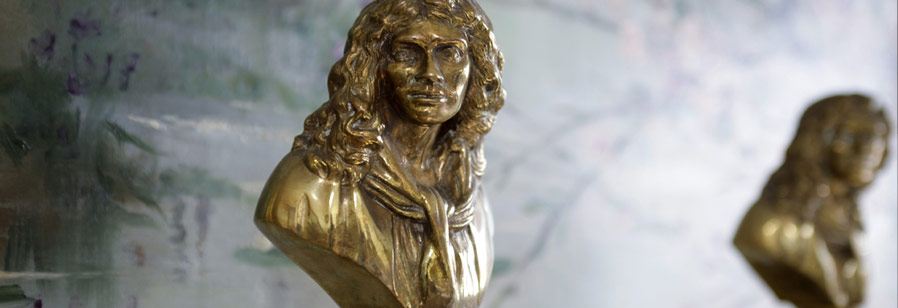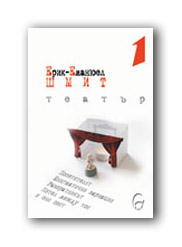Summary
Who do we love when we love ? Do we ever know who the beloved one is ? Is mutual affection but a happy and lucky misunderstanding ?
Love is a mystery and the very reason why, on the stage, one man faces. On one side, Abel Znorko, a Nobel Prize of literature who lives far from men and civilization. On his island lost in the middle of the Norwegian sea, he keeps on remenbering the woman he loved passionately and with whom he corresponded for a long time. On the other : Erik Larsen, a journalist who wants to interview the writer.
But the interview is only a pretext. So what is Larsen's secret motive ? What is the link between him and this woman Znorko claims he has never forgotten ? And most of all, why has the misanthropist agreed to meet him ?
The encounter will quickly turn into a very cruel and vicious truth game. The two men, like two boxers, will in turn reveal their secrets in many dramatic turns and with a suspense distilled with much talent.
Comments
« My characters talk a lot... »
My characters talk a lot but they very seldom speak the truth. Otherwise there would not be any play at all.Once they have spoken their truth, life is going to deny it. Otherwise I would not acknowledge the play as one of mine.The clash between our thoughts and reality may be the main theme to be found in my plays. It is easy to have convictions but it is necessary to get rid of them. Men cannot always keep hiding from life behind their beliefs, their choices, their convictions. Life is full of surprise ; it does not always come up to our expectations, it keeps upsetting our plans, it brings some density and forces itself upon us with all its mysteries. Not one abstract point of view can stand against life. Not one philosophy has never succeeded in solving life and its mysteries. As far as truth is concerned, i'm a widower. But a merry one. I do enjoy mysteries. I can understand with much delight that life cannot be understood. Enigma Variations is certainly my most autobiographical play. Like Znorko, I know what treason means, I have listened to endless lies, I have gone through many lonely hours and I have seeked refuge in my writing. Like Larsen, once I loved, in a very simple and humble way ; from day to day, I looked after the beloved woman in sickness and in death. Like these two men, I was inflicted these masquerades when identities have all been exchanged ; I experienced the love which is not necessarily in harmony with one's sexual tastes, I was confused and I nearly lost myself, but in the end, it enabled me to find much more than my own self. I have often walked around the same emotional labyrinths as my two characters.But I will say no more. We have to put an end to the game of resemblances. You cannot rely on life as much as on fiction : contrary to Znorko, I haven't been awarded the Nobel Prize of literature yet and I do live on an island but I have to share it with other people...Znorko and Larsen embody two ways of loving.Znorko needs to be far to love whereas Larsen needs to be very near the person he loves. Znorko is a romantic hero, Larsen on the contrary is a realistic character. Znorko is very sensuous. Too sensuous. He does not think that sexuality is the right manner to attache someone to someone else. He very well knows that sexual things are like some short-lived, unstable and inconsequential fever. He is perfectly aware of the utter helplessness of sex in a love-story. That is exactly why Znorko has tried everything to spiritualize his love for Hélène, to make it stronger, by keeping her at a distance, by putting an end to their embraces. He forced bodies to be parted. But he goes on living his passion for Hélène through a daily correspondence with her. He turned his love-story into a literary affair. Contrary to what he wants us to believe at the beginning of the play, he thinks highly of love. We must not forget that he even managed to sacrifice both the body and the presence of the beloved to that high ideal.Larsen, on the contrary, has no preconceived ideas on love. He lets himself be carried away by it. When he married Hélène, he agreed on anything : from everyday life to routine and its limits, from illness to agony and to death. After the funeral, he even went as far as to accept being betrayed. He accepted Hélène's other love. He even accepted the loss of his sexual identity.When you first look at him, he seems dull, grey, ordinary and shy, but in fact, he is the real soldier of love. He agreed on his life being invaded and changed in the name of love.Who is right ? Neither of them : and it is a comedy. Both : and it becomes a tragedy. Znorko and Larsen are the embodiments of our conflicting tensions. Their position is so extreme that they suffer a great deal and they are on the verge of neurosis. Neither of them can be contented with his own excesses. Znorko, at the beginning of the play is desperately lonesome. Larsen at the end needs the correspondence to go on.For years, I have been receiving hundreds of letters and they all ask the same question : "What happens when the last cue is said ?"My answer is always the same : 1) I don't know otherwise I would have added some more scenes after the final one.2) I wrote the play for the audience to ask themselves the question. What may happen ? Are the two men going to write to each other as if Hélène was still doing it ? Without her, is it still possible ? Are they going to meet again ? Up to what point will they acknowledge that there is some love between them ?I really think that a play is not restricted to the time of the performance and the pleasure you get out of it. A play must disturb, must force people to ask themselves and about the play itself...Very often, spectators have told me what is supposed to happen when the play is over. And I realized that they were not speaking about the play but about themselves. As human beings, they were reacting in their own way to that very strange love-story.And this was my sole aim. Malvern, England, May 12th 2000Eric-Emmanuel-Schmitt
Reviews
L'Express - « Enigma Variations »
We Loved it !Some love-stories take places in novels, others on stage. E.E.Schmitt has written a play called Enigma Variations. And it is one of the greatest love-stories ever.Inspired by one of the British composer Edward Elgar's musical works also called Enigma Variations, the play deals with the most famous and mysterious riddle of all : "Whom do we love when we love ?". Trying to find all the possible answers to that question, Schmitt has written a beautiful symphony ; at the same time, very simple and thrilling witty and deeply moving : a play with many surprises and dramatic turns of events, skilled and wonderfully astonishing !A man who claims to be a journalist comes to interview a writer on his last book : a collection of letters. For two hours, they are going to speak of love and love only. Between clashes and confessions. On one side : Francis Huster is the journalist whose self-control and softness move us deeply. On the other side, Alain Delon is the perfect recluse writer. He makes fun of his own weaknesses and his powerful personality gives strength to the whole production. He is most excellent in the last part of the play when the misanthropist who used to keep putting on airs is reduced to nothing but sorrow and generosity : to "the milk of human kindness." Christophe Barbier
Le Figaro - « Enigma Variations »
E.E.Schmitt's new play uses by turns greatness and harshness in the character's feelings, elegies and duels, the ecstasy and the frenzy which are part of any contest, love and its mysteries, so different from passion, with many lyrical heights, cynical dirty tricks and sensational dramatic turns. Frédéric Ferney
Le Monde - « Enigma Variations »
E.E.Schmitt controls his plots to perfection and with such craft ! !The play is the criss-cross of three destinies : two men and a woman who is no longer alive.All along the play, love is going to be sharply analyzed and dissected as well as the whole set of sufferings which generally comes along : cowardice, pleasure and frustration.At last, here is the masque again, which has always been the emblem of the golden age of the stage and that we missed for such a long time.Terrific performances of the two actors and a wonderfully bold text. Olivier Schmitt
Le Point - « Enigma Variations »
Such a mastery in the drama and its progress ! What a strength and such delicacy in the way characters and temperaments are set against one another ! And what elegance in the musical parable which is also one of the keys to the play. Every night the house is full because of some jounalistic topsy-turvy surrounding the play.But with all this fuss, the public may forget what the real meaning of this event is : the establishing of a new French playwright. Which would be a pity ! Pierre Billard
Le Soir - « Enigma Variations »
The text is excellent ; suspense, love, creation, imagination, Schmitt plays with ideas, characters and temperaments, the nobility and the wretchedness of life. The stage is a game for Schmitt and he knows how to make philosophy brighter, more cheerful especially in his witty dialogues.That is why our most inner thoughts are brought into full daylight.His answers sound obvious and clear. Schmitt is a brilliant and merry playwright. Pascale Haubruge
Elle - « Enigma Variations »
You have to go to Marigny at once !It is a rather strange story which takes place on the stage. As mysterious and new as Nicolas Sire's misty setting : a cloudy and misty sky and some glaucous waters with a few rocks scattered here and there. Vertical and horizontal designs which will be disarranged one after the other and which are the start of a complex plot. Exactly like Elgar's music so simple, so magnificent when you first listen to it and which becomes obsessing, jerky and so complex in the end.A real tune which stresses the misfortunes of both Abel Znorko (Alain Delon) and Erick Larsen (Francis Huster).What is the play about ? The meeting of two sacred monsters in real life but also two strongly-spirited characters on the stage. One is a writer. He has just finished his 12th book and has always refused any kind of interview : "I hate journalists. I only talk but to myself. 25 years during which there have been misunderstandings with the press and the critics. Quite a lovely career, isn't it ?" The other is a journalist, or so it seems, who has decided to make the "ogre" (Znorko's nickname) talk.The latter has been living on his Norwegian island as a recluse for years Znorko is definitely a beast who only reacts instinctively. The tempo of his life ? He listens to the cries of the sea-gulls, he only eats meat and vegetables. He only makes love to the women who are brought to him from the continent. And most of all, he keeps steeping into pleasure. We have a eulogy of love spoken by Delon which shows that love is nothing but an invention of men and society with notion that it lasts. On the contrary, pleasure itself would be linked to the present moment only. A relation to time which speaks volumes for what is going to happen. The so-called journalist is much more than an impostor, he is the husband of the lady to whom Znorko has dedicated the book. You see what i mean ? Larsen has come to call Znorko to account for his conduct, maybe to get rid of him. Znorko, the former lover of Larsen's wife will confess : "She loved me so much that she made me like me ! For our love to be even stronger, i had to put an end to the affair. It was a terrible suffering. We had spent five months in each other's arms." It hurts even more when we learn that after the separation, Znorko was no longer able to write, as he was obsessed by the memory of her. "You gave her up for your work." Larsen replies. I won't say another word about the play. You will have to go to Marigny ! But simply remember this : "You need lies to make the dead come to life again !"A powerful piece of work. Huster and Delon are a remarkable duet worthy of the Beauty and the Beast, in love with the same person, hurt by so many disillusions and their meeting is like a first-rate boxing match whose referee is Bernard Murat.What can we say about Schmitt ?It would be quite unfair not to thank him for that most enchanting evening ! Françoise Delbecq
Publications
- In Bulgarian, published by Lege Artis
- In GAlician, pubkished by Rinoceronte










